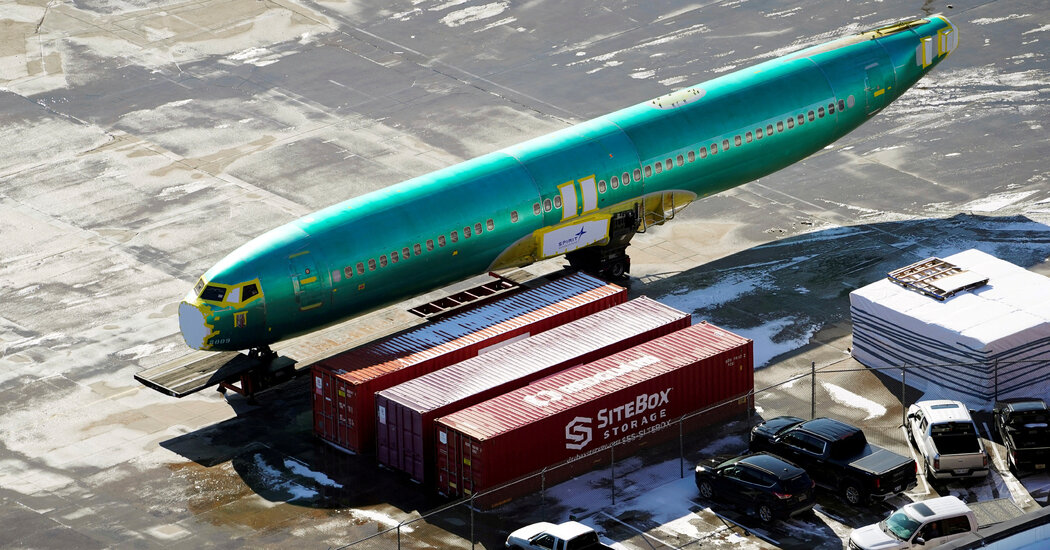Boeing said Monday it had agreed to buy a major supplier, Spirit AeroSystems, ending a nearly two-decade experiment in outsourcing the production of key components of its commercial jets, including the fuselage of the 737 Max and parts of the 767, 777 and 787.
In buying Spirit, Boeing hopes to curb the quality problems that have plagued the supplier in recent years. While it already has significant influence over Spirit, Boeing will be more easily able to monitor and change manufacturing practices by owning the business. Boeing has taken internal steps to improve quality as well, following a horrific incident in which a panel blew off one of its planes during a flight in January.
“By reintegrating Spirit,” Boeing Chief Executive Dave Calhoun said in a statement, the company “can fully align” its production and safety systems with its workforce.
The deal, which was widely expected, was valued at $4.7 billion in stock, or $8.3 billion including Spirit’s debt. It is subject to approval by regulators and Spirit shareholders. Boeing will also divest parts of Spirit to Airbus, its European rival, as part of the transaction. Boeing said it expected its acquisition of Spirit to close by the middle of next year.
The acquisition represents a strategic shift for Boeing, which began relying more heavily on independent suppliers in the early 2000s to cut costs and boost profits. Spirit was created during that outsourcing in 2005, when Boeing sold a division in Wichita, Kan., and operations in Oklahoma.
In addition to its work for Boeing, Spirit makes components for aerospace companies including Airbus, Bombardier, Lockheed Martin, Northrop Grumman and Rolls-Royce. Boeing accounted for 64 percent of Spirit’s net revenue last year, while Airbus accounted for 19 percent. Boeing offered to buy Spirit for $37.25 a share, a 30 percent premium over Spirit’s stock price in late February before the two companies announced they were in talks.
Spirit’s quality problems led to a leadership shakeup last fall in which Patrick Shanahan, a former Boeing executive and former senior Defense Department official, became chief executive. At Boeing, Mr. Shanahan was considered an accomplished executive who could quickly turn around troubled programs or units. He is a leading candidate to replace Mr. Calhoun, who plans to leave by the end of this year.
But Boeing has its own quality problems. It has faced intense scrutiny since the Jan. 5 incident in which a panel on a 737 Max 9 exploded on an Alaska Airlines flight shortly after takeoff. The panel, known as a door outlet, covers the gap left by an unnecessary emergency exit.
News of the Spirit settlement came hours after a report that federal officials planned to offer Boeing a plea deal in a fraud case related to a pair of fatal crashes more than five years ago that killed 346 people.
While no serious injuries were reported in the January episode, the consequences could have been much more severe if the panel had exploded at a greater height when passengers could have moved around the cabin. The National Transportation Safety Board has said the plane appears to have left a Boeing factory without the bolts needed to secure the plug, and the company said it could find no documentation of that work. The plug had been removed so Spirit workers could make repairs.
In response, Boeing has made several changes in recent months. It said it has expanded training, streamlined plans and processes and increased inspections at its 737 factory in Renton, Wash., as well as at Spirit. Since March, it has also stopped accepting 737 fuselages, or fuselages, from Spirit that don’t fully meet Boeing’s standards — rather than tolerating some defects that can be fixed later to keep production moving.
That change has brought significant benefits, Elizabeth Lund, a senior Boeing quality executive, told reporters at the plant last week. Significantly fewer major defects need to be fixed by Boeing now, she said, and the company is able to assemble the Max much faster once the bodies arrive in Renton.
Boeing has also said it intends to reduce its practice of performing production tasks out of sequence, a practice known as traveling work. Some travel work is considered necessary, but too much can disrupt the complex process of manufacturing airplanes, possibly contributing to defects and shoddy work.
At the press conference, Ms. Lund also shared new details about how the plane involved in the January flight left the plant without the door latch fully secured. After the plug was removed to make repairs nearby, a crew prepared the plane to be moved out by putting the plug in place without its bolts, which was not that crew’s responsibility, she said.
Ms. Lund’s disclosure of the new information, along with other comments at that briefing, infuriated the NTSB, which sharply reprimanded Boeing for breaking rules to talk about an ongoing investigation.
Boeing apologized to the safety board, admitting it “exceeded the NTSB’s role as a source of investigative information.”
